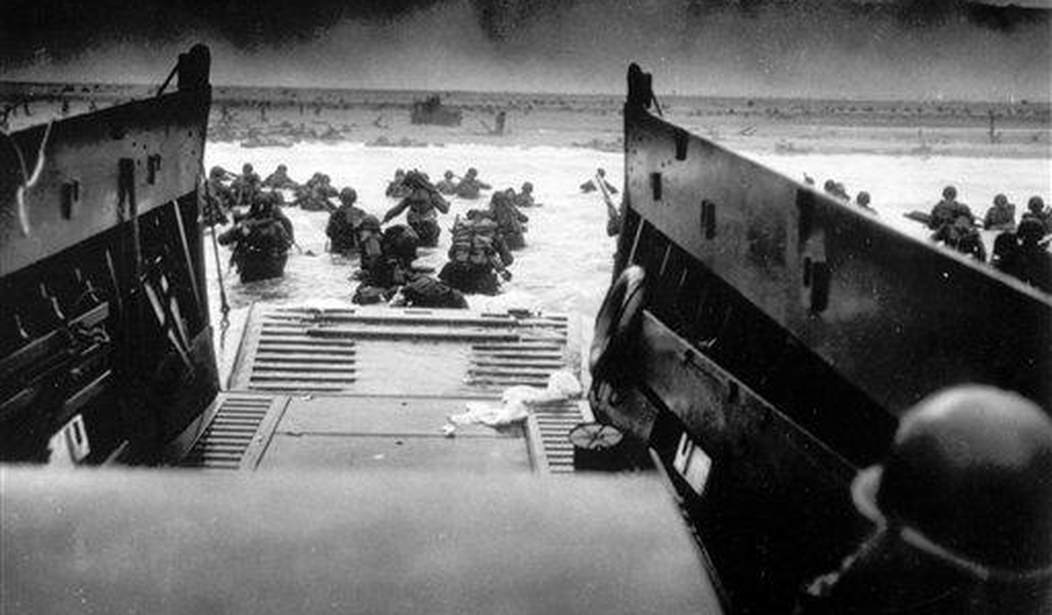Crossing the Normandy beaches on D-day, crosshatched with glowing tracer fire, was just the beginning. If you’ve seen Saving Private Ryan you can imagine how American soldiers must have resigned themselves to death, disembarking from troop carriers, bobbing like corks in a capricious sea, the landing decks withdrawing their meager protection to allow screaming lead unfettered access to soft, mortal flesh — bone and blood turned to powder and mist before the German buzz saw, the MG-42 machine gun.
Paratroopers were culled in the air and on the ground by bullets and bombs that transformed living men into tattered torsos, denuded of limb. Sometimes cruel fate just dangled a placid corpse in the trees — an efficient 8mm hole left to tell the tale of death. Meat grinder is an apt analogy and barely loses relevance even taken to the fringes of useful meaning. The greatest generation faced horror defying description only to confront what master thriller writer Stephen Hunter calls The Bullet Garden — the newest addition to his “Earl Swagger” novel collection.
A checkerboard pattern of pasture, woodlands, farmer’s fields, and hedgerow was a feature of the French countryside during World War II. Over centuries, this hedgerow had grown into a thick bramble of intertwined vines, branches, and leaves creating a wall of vegetation. All of this created a terrain known as “bocage.”
From the beaches of Normandy, allied forces moved into this pastoral typography, where Germans had burrowed and fortified with machine gun emplacements, mortar positions, and notched firing berms. Worst of all the Wehrmacht had loosed the Tiger tank, the most feared battle tank of the war, and hardened SS troops to prowl and reave. The German soldiers lurked in their “fieldgrau” uniforms, waiting to let fly their copper jacketed seeds of death into The Bullet Garden — “a fairytale verge set in hell.”
Stephen Hunter has written over twenty novels, so you’re in expert hands. In 2003 he was awarded a Pulitzer Prize for Distinguished Criticism. And, he’s an affable, quick witted, gentleman, demonstrated during his recent interview with Townhall.
Recommended
As with any finely crafted thriller, Hunter plunges you into the thick of the action from the outset. You’re instantly conscripted into an OSS operation, set near Tulle, deep behind enemy lines. The mission: to thwart the imminent advance of the 2nd Panzer Das Reich and their feared Tiger tanks. Much of the success of D-day rides on delaying this elite SS unit.
Individual heroism coupled with the tactical use of the British Bren machine gun, wielded by erstwhile “red” allies, presses for success amid withering fire from fanatical SS troops and their merciless mortar teams. Trees are smashed into wooden shards of shrapnel by small arms fire, while the concussive force of detonating mortars crush OSS agents into insensate confusion.
From the very first chapter, it’s an orchestrated masterpiece of literary carnage. And, if you’ve wondered what an exploding mortar shell smells like, read The Bullet Garden. But be forewarned, you may find yourself ducking for cover under your couch.
What is most special about Hunter’s writing are his tactile, fully three dimensional characters. You’re not just reading about them, you hear them, and feel their features such as Earl Swagger’s “cheeks like howitzer shells,” or the “diaphanous cling” of Millie Fenwick’s gown. These are living, breathing people who speak authentically and are conjured into reality by the confluence of art and language. You wish you could invite them over, share an evening of enthralling conversation, and call them friend.
For Hunter, character development also applies to the tools of warfare. He’s clearly a devotee of the M1 Garand battle rifle — an implement General George S. Patton described as the finest battle rifle ever produced by any country. Hunter takes pains to breath life and color into the inanimate components, the wood and steel of the legendary rifle. And, he does all this with skill, detailing various weapons systems without derailing the momentum of plot.
During an interview with Townhall, Hunter said, “I functioned for many years in the liberal journalism culture…but I can talk guns with anyone…I own a Garand rifle. It’s a spectacularly wonderful rifle…I try to make the guns real, to give them features, personalities, peculiarities, what it’s like to carry them, what it’s like to maintain them. I try to make them very vivid and an authentic part, because they would have been in WWII…those men lived and died by their firearms.”
Hunter told Townhall that he corresponded with the hunting and firearms training legend Col. Jeff Cooper who defined the modern theory of the pistol by distilling his combat experiences during WWII.
There is magic in Hunter’s latest thriller and it’s the deep magic of words crafted to mesmerize and capture the consciousness within the vivid cosmos of masterful fiction. There is nothing in his prose to break the spell.
Plot is intertwined and at times divergent, but never confusing. It’s at once a thriller and a mystery. Hunter paints a sweeping tableau fit for strategic, theater scale combat while simultaneously creating vignettes that nest the world of brutally intimate sniper warfare. It drives the plot forward like an itch you just have to scratch, and the pleasure of advancing through the story obliterates any sense of time in the corporeal world.
There are big truths In The Bullet Garden, hidden like gems burning with stolen sunlight. They lie in unexpected places and make this work much more than frivolous entertainment. Here’s one of my favorites — “He whom the gods destroy first they make proud.” There is much more to be gleaned that will enrich and entertain.
The Bullet Garden is available today. From the first page to the last, you’ll wish for more. Hunter has produced a large body of work, so the thriller devotee may wantonly feast to the soul’s content.

























Join the conversation as a VIP Member